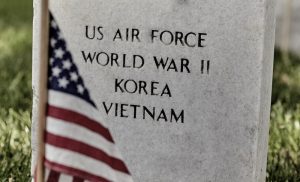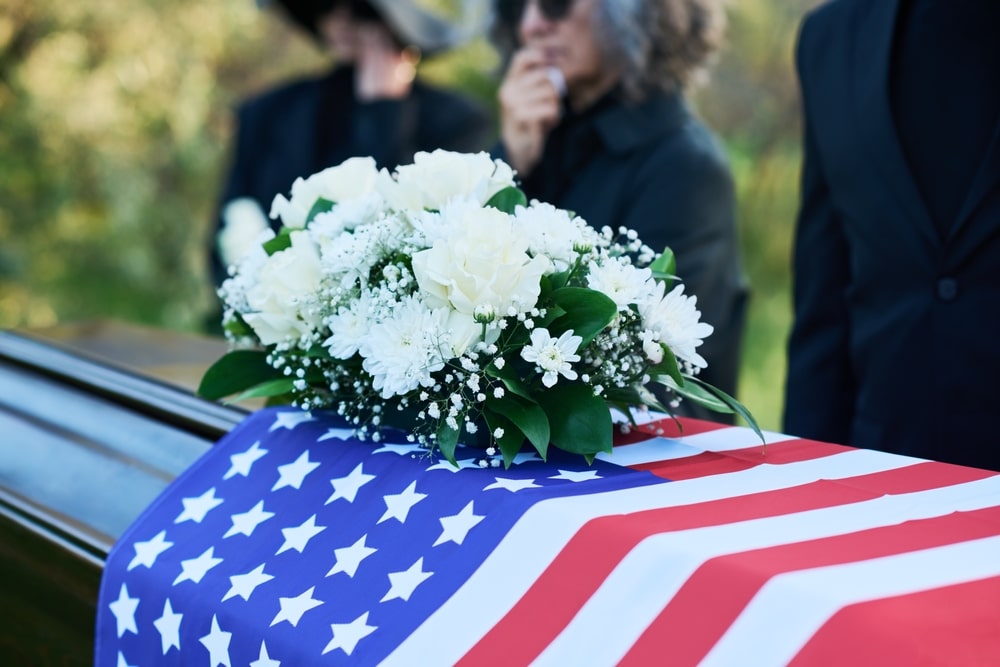
As a veteran, you know there are a lot of great benefits out there for you, like discounts, educational grants and scholarships, pension, and healthcare. But are you familiar with the 5 key burial benefits available to you and your family? Let’s briefly break down each benefit, so you know exactly what to request and how to save your family money by taking advantage of all the services open to you.
Three Quick Notes
Before we look at each benefit, a couple of quick notes for you.
- Though they are called “burial” benefits, they also apply to cremation.
- Each benefit is available free of charge, though they must be requested.
- Only veterans with a discharge other than dishonorable are eligible to receive benefits.
- Some benefits are also available to eligible spouses and dependents (see below).
Burial Benefit #1: Burial Allowances
What is a burial allowance? In a nutshell, burial allowances are a designated dollar amount that the VA will reimburse to your family to assist with the cost of a veteran’s funeral. Burial allowances are often split into two categories:
- A burial and funeral expense allowance (associated with funeral or memorial options)
- A plot interment allowance (associated with burial costs of a casket or urn)
Burial allowances are available to help offset the funeral costs of an eligible veteran, spouse, or dependent child. (They do not pay for the funeral in full.) To apply, your family must fill out VA Form 21P-530, “Application for Burial Allowance.” Include proof of military service (DD 214 or equivalent), a death certificate, and receipts to claim reimbursement. Your funeral director will be familiar with this process and can help you do it correctly.

Burial Benefit #2: Cemetery Options
Choosing a final resting place is a very personal decision, and it’s always good to know your options. In the VA’s eyes, there are three types of cemeteries: national, state veterans, and private. Let’s review each one and the benefits available for each.
National Cemetery (free of charge)
In addition to burial allowances, the VA also offers burial (cremated or full body) in a national cemetery through the National Cemetery Administration. This benefit includes a plot, opening and closing of the grave, perpetual care, and a government-issued headstone. While placement is based on availability, you, your spouse, and any dependent children can be buried in a national cemetery. Of course, as with anything, there are certain rules and guidelines.
There is no charge for a burial plot in a national cemetery. Because of this, the plot allowance is not available to the families of veterans who are buried in a national cemetery. In some cases, the VA may even pay for the cost of transporting a deceased veteran to the national cemetery. Speak to a local funeral director or your regional VA office to get more details.

State Veterans Cemetery (minimal fee)
A second option for burial is a state veterans cemetery. These cemeteries are facilitated by individual states, not by the National Cemetery Administration, so the regulations will vary. Because of this, you or a funeral professional will need to contact your nearby state veterans cemetery to see if there are any fees associated with burial there and if they allow dependents to be buried on the grounds.
Private Cemetery (personal expense)
If you choose burial or inurnment in a private cemetery, then you and your family are responsible for the cost. However, you can apply for burial allowances to help with the overall cost. Make sure to keep all receipts, so you can receive a reimbursement. Spouses and dependents buried in a private cemetery receive no VA benefits.

Burial Benefit #3: Government-Issued Headstones or Medallions
Regardless of the type of cemetery you choose, veterans are always eligible to receive a government-issued headstone or medallion. But what’s the difference between the two?
Headstones
As you’ve likely seen at national cemeteries or in the movies, the government issues uniform headstones or plaques to mark the graves of military members. The VA will provide a government-issued headstone to mark the grave of an eligible veteran buried in a national, military post/base, state veterans, or private cemetery. If you want, you can even request a government headstone for an eligible spouse or dependent buried in a national or state veterans cemetery.

Medallions
Alternatively, if you prefer burial in a private cemetery, you can request to receive a medallion rather than a government-issued headstone. Medallions are durable and can be easily affixed to any headstone. They offer you a way to identify as a veteran while also choosing a personalized grave marker. There are different varieties of headstones and medallions available. Click here to view the options available through the National Cemetery Administration. Spouses and dependents are not eligible to receive a medallion.

Burial Benefit #4: Burial Flag with Military Honors
Because the American flag is a symbol of your service and sacrifice, its presence is a tribute to your life and a sign of the nation’s gratitude. Due to its importance, the VA provides an American flag to drape the casket or urn of every veteran. After the funeral or memorial service is complete, the flag is given to the next of kin. Only one flag is issued per veteran.
In addition to a burial flag, eligible veterans may receive military honors at a funeral service, which includes folding and presenting the United States burial flag and the playing of Taps. For more information, take a moment to read “The Core Elements of a Military Honors Funeral.”
Note: Spouses and dependents are not eligible to receive a burial flag or military honors.

Burial Benefit #5: Presidential Memorial Certificate
Lastly, the VA offers a Presidential Memorial Certificate (PMC), which is an engraved certificate, signed by the current President, that is given to honor your memory and your service. Your family can then display it in the home or hold onto it as a keepsake of your life and commitment to serve. Perhaps it goes without saying, but spouses and dependents are not eligible to receive a certificate.
And that’s it! Together, these five elements make up the basic lineup of burial benefits that are available to an eligible veteran: burial allowances, burial in a national cemetery, government-issued headstone or medallion, burial flag, military honors, and Presidential Memorial Certificate. Now that you have this information, what should you do next?

Consider Preplanning for Your Funeral Wishes
Given your experience as a service member, you know how complicated things can get, whether it’s updating your Page 2, keeping an eye on your LES, or just getting an updated government ID. By preplanning for your funeral wishes, you can jump through all the hoops now, ensuring your family doesn’t have to do it in the future.
To learn more about the benefits of planning ahead as a veteran, read “Why Should Veterans Plan Ahead?” or schedule a visit with a local funeral director or Veterans Service Officer (or both!). With a knowledgeable professional by your side, you can get all your questions answered and put together a plan that honors your life and meets your family’s needs.





